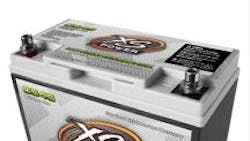Lithium technology comes to car batteries
Most people's experience with lithium batteries is limited to the power pack in their laptop. But lithium batteries have also recently become a popular way of saving weight in race cars, particularly dragsters. Now, more general-purpose lithium batteries have become available targeting other classes of race cars. But these power packs can work with almost any car that contains an alternator, opening up the possibility of installing them in ordinary street cars.
The rationale for using a lithium car battery would be to save weight and thus boost mpg slightly. We suspect a more compelling reason, though, would be "green" bragging rights. For example, consider the C545 Lithium Powerpack developed by XS Power. It is designed for starting engines up to 3.0L and yet weighs a mere 3.63 lbs. This 12-V lithium-ion battery is billed as having 53 min of reserve at 25 A and a pulse-hot-cranking-amp (PHCA) rating of 925. It can deliver 1,200 A max and 250 A continuously. XS Power says this is more than enough to start V8, V10, and V12 engines and supplement the alternator output.
Of course, anyone who installs one of these things in their vehicle has to be highly motivated to do so: The C545 will set you back $789. XS Power has other lithium-ion car batteries that run up to $1,414. Obviously, these are not like your $125 DieHard.
And assuming you are of a mind to install a lithium-ion car battery, figuring out exactly which one to use poses challenges. These are essentially race car batteries and have ratings that differ from those of conventional units. For example, your typical vehicle battery carries a cold-cranking-amps (CCA) rating. This refers to the number of amperes a battery can support for 30 secs at 0°F until the battery voltage drops to 1.20 V/cell, or 7.20 V for a 12-V battery.
But you'll generally not see a CCA rating for race car batteries. There is no official definition for the more typical PHCA figure applied to these devices. But battery manufacturers regard the PHCA as a short duration (typically about 3 to 5 sec), high-rate discharge. This discharge is more like a pulse because of it’s short duration.
Another point to note is that protection against low voltages is important for lithium batteries because they are sensitive to being discharged below 80%. In a 16-V battery (5 cells) this level would be 12.0 V. Such conditions can drastically shorten the battery life. So in some lithium-ion models, battery makers will build in microprocessors and fusing that will cut power if voltage drops to dangerous levels.
However, such conditions are most likely to happen in race cars that have no alternator. For use in race cars with alternators (or street cars driven by fanatics), less expensive lithium-ion batteries may incorporate individual cell balancing and guarding but no extra protection system. Still, in the event of an offending condition, the guarding system engages and the battery is safely limited from damaging itself or surrounding components.
For those who are undaunted by the price and additional complications, lithium-ion car batteries can be found here: http://4xspower.com/products/lithium/
